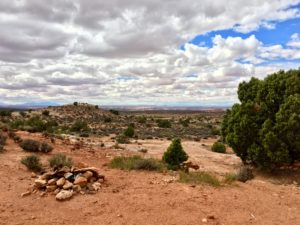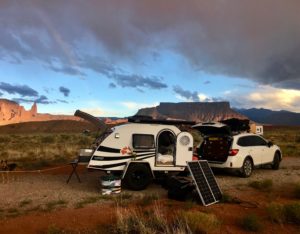 Boondocking, dry, primitive, and dispersed camping are similar terms. It’s free, off-grid, has no services and in my experience mostly no neighbors. Boondocking is that place where the drone of civilization ends and true wilderness begins.
Boondocking, dry, primitive, and dispersed camping are similar terms. It’s free, off-grid, has no services and in my experience mostly no neighbors. Boondocking is that place where the drone of civilization ends and true wilderness begins.
The BEST Secret Tip of Boondocking
Boondocking’s biggest bonus besides being free is increased access to the most spectacular vistas and settings in the country with  absolute privacy. If you and your dog love to roam off leash no problem. There’s no lights to mess up your star gazing, no loud motors and generators to mask the sounds of nature, and no artificial schedules to interfere with natural sleep and wake cycles.
absolute privacy. If you and your dog love to roam off leash no problem. There’s no lights to mess up your star gazing, no loud motors and generators to mask the sounds of nature, and no artificial schedules to interfere with natural sleep and wake cycles.

Wildlife is abundant and often curious. I’ve camped in such remote places the baby native trout swam around my legs when I was fly fishing! Of course I opted to abandon my rod in favor of my first ever fish petting session!
In remote, natural settings bears, mountain lions, wild hogs, raccoons and other critters are also curious. Securing food boxes or food storage in your car is a must. Be sure and keep pets inside at night. Become familiar with best strategies for escaping animal attacks.
1. How do you find these places?
Maps, apps, websites, and natural curiosity with a mix of tenacity are great tools. Knowing how to talk with locals also helps.
Free Resources
National Forests and Bureau of Land Management (BLM) list dispersed camping areas on their websites. Other websites include free campsites.net and boondocking.org. The National Forest prints  free Motor Use Vehicle Maps for every national forest. Park Rangers are excellent sources for the best secrets in their regions.
free Motor Use Vehicle Maps for every national forest. Park Rangers are excellent sources for the best secrets in their regions.
Resource Worth The Money
A favorite resource of mine are the Frugal Shunpiker’s RV Boondocking Guides ebooks with excellent boondocking options in  five states. The information is accurate and specific, including GPS coordinates to sites. Their website the frugal-rv-camper.com is another fantastic resource.
five states. The information is accurate and specific, including GPS coordinates to sites. Their website the frugal-rv-camper.com is another fantastic resource.
 Don’t Forget The Apps
Don’t Forget The Apps
Apps include Free Camping, Boondocking, and Campendium. Most places don’t have internet or cell service so I tend to rely on paper maps or those that I’ve downloaded online for offline use.
Many private land owners offer camping spots for a fee. You can find these through websites like Hip Camp (pricey) and Boondockers Welcome ($30 annual fee, free overnight parking for members)
2. How do you get to these places?
 Be prepared to drive miles on unpaved, often gnarly roads. Good ground clearance is important. You’ll have many more opportunities to boondocks in a small RV, truck camper, or tent than a larger unit.
Be prepared to drive miles on unpaved, often gnarly roads. Good ground clearance is important. You’ll have many more opportunities to boondocks in a small RV, truck camper, or tent than a larger unit.
National Parks do not have dispersed camping but most are surrounded by public lands (National Forest, BLM, etc.). Remember National Park boundaries are man-made and natural beauty often extends beyond the artificial park perimeter. There are 155 National Forests and 20 National Grasslands in the United States, comprising 191 million acres.

3. Boondocking Rules & Etiquette
![]()
 Aways drive on existing roads and pick a site that has been used before. Camp on bare soil if possible, to avoid damage or killing plants and grass. Plants, soil and wildlife are impacted by new campsites so using existing ones minimizes your impact.
Aways drive on existing roads and pick a site that has been used before. Camp on bare soil if possible, to avoid damage or killing plants and grass. Plants, soil and wildlife are impacted by new campsites so using existing ones minimizes your impact.
 Follow the seven Leave No Trace guidelines.
Follow the seven Leave No Trace guidelines.
- Dispersed camping is typically allowed in a one-mile perimeter away from campgrounds and 100 feet from any stream. To prevent resource damage please keep your campsite within 150 feet from a roadway.
2. Do not camp in the middle of a clearing or meadow; try to make
your campsite less visible so that others will see a natural, wild setting.
3. Do not try to level or dig trenches in the ground
at your campsite. 4. Pick a site that is already level with good drainage.
 5. Use existing fire pits and rings. Campfires are allowed unless there are fire restrictions in effect due to high fire danger conditions. It is your responsibility to know if fire restrictions are in effect. You can learn about any fire restrictions by contacting the nearest Forest Service office. Use firewood purchased from the area or collected near your camp (dead wood only). Make sure firewood collection is allowed.
5. Use existing fire pits and rings. Campfires are allowed unless there are fire restrictions in effect due to high fire danger conditions. It is your responsibility to know if fire restrictions are in effect. You can learn about any fire restrictions by contacting the nearest Forest Service office. Use firewood purchased from the area or collected near your camp (dead wood only). Make sure firewood collection is allowed.
 6. The poop issue. I use a portable toilet so I can easily pack out waste. Be sure and include your animal’s poop in your pack out. If you’re backpacking dig a hole six inches deep at least 100 feet away from any water source. When you are done, fill the hole with the dirt you dug up and take your toilet paper with you to dispose of in a proper waste container.
6. The poop issue. I use a portable toilet so I can easily pack out waste. Be sure and include your animal’s poop in your pack out. If you’re backpacking dig a hole six inches deep at least 100 feet away from any water source. When you are done, fill the hole with the dirt you dug up and take your toilet paper with you to dispose of in a proper waste container.
7. Most public lands have stay limits—usually two weeks. Once your time is up you’re required to move on to another location at least 25 miles away. The deal about ignoring this rule is authorities have to get involved and it increases the possibility areas will be closed.
Don’t Be ‘That Guy.’
One time while boondocking in a very remote, low population Colorado area a guy in a huge RV set up camp right next to me as if we were in an established campground. At night he turned on LED lights all around his rig, including string lights on his awning. He ran a generator all night. DON’T be That Guy!
 Most of us boondock to get away from That Guy and all of civilization. Honor this as you’re scoping a site. In most cases you can move on down the road and find your own piece of heaven. Never move in on an occupied site unless you have exhausted all other options in the area. It’s courteous to ask permission if you’re wanting to move in on another occupied site. In big tourist areas where dispersed camping is limited this may be hard to do.
Most of us boondock to get away from That Guy and all of civilization. Honor this as you’re scoping a site. In most cases you can move on down the road and find your own piece of heaven. Never move in on an occupied site unless you have exhausted all other options in the area. It’s courteous to ask permission if you’re wanting to move in on another occupied site. In big tourist areas where dispersed camping is limited this may be hard to do.  Boondocking is first come first serve, so be prepared to leave if you didn’t make it first.
Boondocking is first come first serve, so be prepared to leave if you didn’t make it first.
Boondockers are serious about our space, peace and quiet, and dark night skies for star viewing. At a minimum, keep the lights low or off and don’t use generators. Sound and light travels surprisingly far in open areas and along water.
 Keep your dogs with you and be sure they don’t bark constantly. Be mindful that leaving a dog locked in your rig while you hike can present problems worse than barking.
Keep your dogs with you and be sure they don’t bark constantly. Be mindful that leaving a dog locked in your rig while you hike can present problems worse than barking.
Here’s the Deal
If these considerations seem burdensome you might not be cut out for boondocking. Those who primitive camp are willing to travel through rougher roads, go without electricity, plumbing, and company in order to have privacy, dark night skies, and peace and quiet. Make sure your priorities match your campsite selections – as well as your neighbors.

